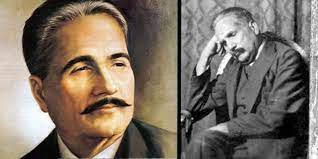According to rahyafte (the missionaries and converts website):Dr. Muhammad Iqbal, commonly known as Allama Iqbal, was a multifaceted intellectual giant of the 20th century, renowned for his contributions to philosophy, poetry, and politics in British India. Among his many influences and sources of inspiration, one figure stood prominently: Imam Ali ibn Abi Talib, the cousin and son-in-law of the Prophet Muhammad.
Early Life and Education:
Born in Sialkot, British India (now in Pakistan) on November 9, 1877, Muhammad Iqbal displayed exceptional intellectual abilities from a young age. He pursued his early education in Sialkot and later studied in Lahore and Europe. Iqbal earned degrees in philosophy and law and went on to complete his doctorate from the University of Munich.

Poetry and Philosophy:
Iqbal’s poetry and philosophical writings, primarily in Persian and Urdu, played a pivotal role in shaping the intellectual landscape of South Asia. He is often referred to as the “Poet of the East” (Shair-e-Mashriq) for his profound and thought-provoking verses.
Imam Ali featured prominently in Iqbal’s poetry and philosophical works. Iqbal admired Ali not only as a historical figure but also as a symbol of wisdom, moral integrity, and leadership. In his poetry, he frequently invoked Imam Ali’s teachings and principles to advocate for social justice, self-realization, and spiritual awakening.
The Role of Imam Ali:
Imam Ali’s legacy resonated deeply with Iqbal’s vision for a just and awakened Muslim society. Iqbal saw in Imam Ali a model of leadership characterized by:
Intellectual Excellence: Iqbal believed in the power of intellect and education to transform societies. Imam Ali’s wisdom and scholarly contributions were a source of inspiration for Iqbal’s emphasis on knowledge and intellectual development.
Social Justice: Both Iqbal and Imam Ali shared a commitment to social justice and the equitable distribution of wealth. Iqbal’s poetry often called for economic reforms and the eradication of social disparities, ideas he found aligned with Imam Ali’s principles.
Spiritual Awakening: Iqbal emphasized the importance of spiritual awakening and self-realization, themes central to Imam Ali’s teachings on inner piety and the journey of the soul.
Courage and Integrity: Imam Ali’s unwavering moral courage and integrity served as a model for Iqbal’s vision of fearless and principled leadership.
Impact and Legacy:
Allama Iqbal’s works had a profound impact on the Muslim world and the independence movement in British India. His philosophical ideas laid the groundwork for the ideological foundation of Pakistan, which was later founded as an independent Muslim state in 1947.
Imam Ali’s influence on Iqbal’s intellectual and philosophical journey highlights the enduring appeal of Ali’s wisdom and leadership beyond the boundaries of time and place. Through Iqbal’s writings, Imam Ali’s legacy continues to inspire individuals seeking guidance on matters of spirituality, justice, and intellectual growth.



















